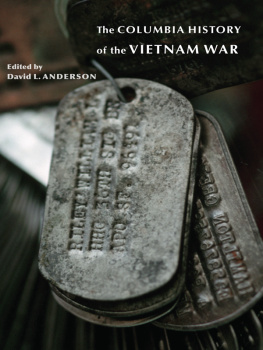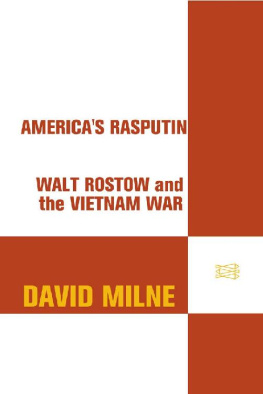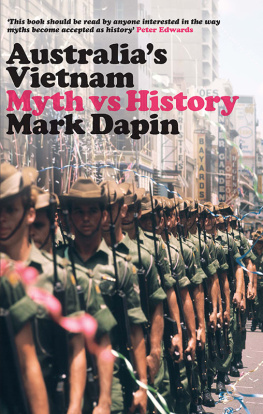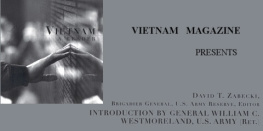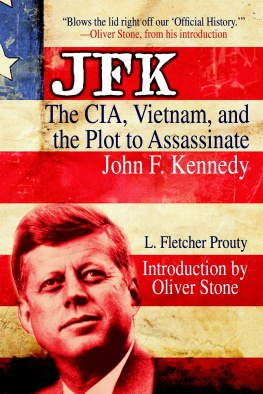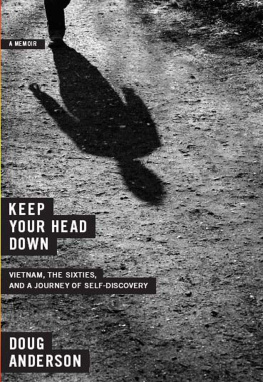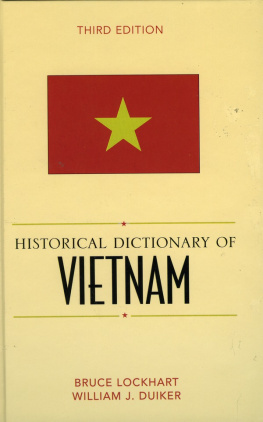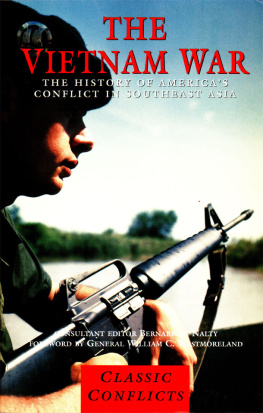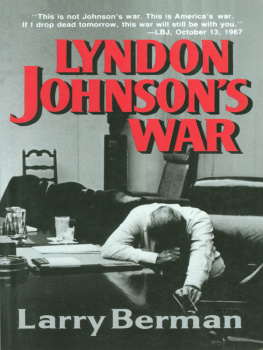The Columbia History of the Vietnam War
The Columbia History of the Vietnam War
Edited, with an introduction, by David L. Anderson

COLUMBIA UNIVERSITY PRESS
NEW YORK
Columbia University Press
Publishers Since 1893
New York Chichester, West Sussex
cup.columbia.edu
Copyright 2011 Columbia University Press
All rights reserved
E-ISBN 978-0-231-50932-9
Library of Congress Cataloging-in-Publication Data
The Columbia history of the Vietnam War / edited, with an introduction,
by David L. Anderson.
p. cm.
Includes bibliographical references and index.
ISBN 978-0-231-13480-4 (cloth : alk. paper)
ISBN 978-0-231-50932-9 (e-book)
1. Vietnam War, 19611975. 2. Vietnam War, 19611975Influence. 3. Vietnam War, 19611975Social aspects. 4. Vietnam War, 19611975Political aspectsUnited States. I. Anderson, David L., 1946 II. Title: Columbia history of the Vietnam War.
DS557.7.C64 2011
959.704'3dc22
2010018853
A Columbia University Press E-book.
CUP would be pleased to hear about your reading experience with this e-book at .
References to Internet Web sites (URLs) were accurate at the time of writing. Neither the editor nor Columbia University Press is responsible for URLs that may have expired or changed since the manuscript was prepared.
CONTENTS
More than thirty-five years have passed since the Paris Peace Accords ended the U.S. military involvement in the Vietnam War, followed two years later by the end of the war within Vietnam among the Vietnamese. Since those closing events of a long and costly conflict, an entire generation of Americans and Vietnamese who had no personal encounter with the war have grown to adulthood. Over this period, too, the Cold War ended. Thus many of the personal and ideological tensions that shaped debate over the Vietnam War in earlier years should have lessened. In fact, however, the Vietnam War has spawned thousands of books and articles that in various ways continue to reexamine and, indeed, to refight the war.
Although the subject still touches emotional and intellectual nerves, the Vietnam War is now history. The war has made the generational move away from experience into what historian Paul Cohen has called event or myth. In his book History in Three Keys, Cohen advances the notion that there are three keys to history: event as narrated or explained by historians, experience as remembered and recounted by participants, and myth as later generations use the past for their own purposes.
This book recognizes the variety of experiences that shape the subject and the myths that surround the Vietnam War. It strives to be an authoritative narration and explanation of this still controversial event. Although there are good general histories of the war by such respected authors as George Herring, Robert Schulzinger, Stanley Karnow, and John Prados, this book is the collective effort of some of the leading experts on the war. It reflects recent scholarship but also the well-considered thoughts of historians who have long examined the subject. The study of the war, as the thousands of titles on the subject demonstrate, does not now and may never approach a level of intellectual agreement that can be labeled definitive, but this collection of essays is designed to provide a reliable reference on a contentious subject.
Not only have the passage of years and the great depth and breadth of writing on the war made the time right for a thorough stocktaking on the Vietnam War, but the Iraq War, which began in March 2003, also presents the need for serious reiteration and review of the lessons and legacy of the Vietnam experience. The United States failed to achieve its objective of an independent South Vietnam, but America was not a defeated nation after the Vietnam War. Its global strength and its international security interests remained great, and the questions of how to use that strength and how to define those interests continued to challenge Americas leaders. Despite declarations by officials of the George W. Bush administration before the Iraq War that the United States was not embarking on nation building, as it had attempted to do in South Vietnam, the difficulties of restoring civil society in Iraq brought forth old rhetoric about winning hearts and minds and establishing credibility that echoed the Vietnam War experience. This book aims to provide a reliable historical perspective on the Vietnam War to advance accurate scholarship and sound policymaking.
Following the introduction, which is an extended essay highlighting some of the major historical themes presented by the Vietnam War, fourteen chapters probe more deeply into some of these themes. The individual essays present clear, well-documented, and provocative arguments, and the entire book comprises a critical approach to the study of the war. The debate over the past thirty years has too often revolved around simple labels, such as liberal and conservative or hawk and dove. The interpretations in these essays strive to avoid stereotypes on the one hand and abstract theory on the other.
The chapters by the contributors are divided into three parts. The essays in part I provide chronological coverage of the war. Mark Philip Bradley begins with an examination of the emergence of Vietnamese revolutionary nationalism that was the impetus for the Vietminh-led war against French colonialism. Richard Immerman surveys the period between the French war and the American war during which the Eisenhower and Kennedy administrations sought to build a nation in South Vietnam around Ngo Dinh Diem. The beginning of the American war under Kennedy and Johnson is the subject of the chapter by Gary Hess, and Lloyd Gardner analyzes Lyndon Johnsons escalation of U.S. bombing and troop levels in Vietnam. Robert McMahon examines the period from November 1967 to November 1968, which he characterizes as the end of escalation and the year during which U.S. policy and politics began to move away from the war. Jeffrey Kimballs chapter describes the paradoxical process by which Richard Nixon both increased the destructiveness of the war and ended the U.S. military intervention.
The essays in part II reflect on the war from a number of topical perspectives. John Prados and Eric Bergerud critically examine in separate chapters the military strategies that Americans employed in Vietnam. Helen Anderson and Robert Brigham look at the war from the perspective of Vietnamese society in their two chaptersAnderson with regard to the role of Vietnamese women on both sides of the conflict and Brigham with regard to the forced urbanization that the war created in South Vietnam and its impact on social values. Melvin Small writes on the tensions within the United States generated by the war in Vietnam, and Kenton Clymer focuses on the mutual relationship of the war in Vietnam with social and political conflicts in Laos and Cambodia. In part III, Robert Schulzinger and George Herring provide insights in separate chapters into the legacy of the war for Americans, Vietnamese, and international affairs.
The assumption behind this work is that many of the historical themes in the study of the Vietnam War have contemporary relevance. Today more than a half-century has elapsed since the end of World War II, the decline of the major European empires, and the onset of the SovietAmerican Cold War. Some of the details of the origins of the French and American wars in Vietnam and the way those wars were fought may seem datedas remote as World War I. When thought of thematically, however, many readily recognizable facts and principles of conduct related to the Vietnam War have continuing significance. Questions of power, technology, democracy, culture, politics, and economics continue to be raised, and discussion of these questions provides understanding of change and continuity in Americas global position since the middle of the twentieth century.
Next page
